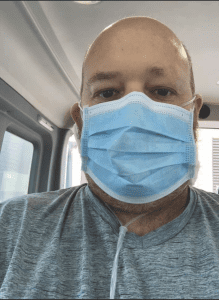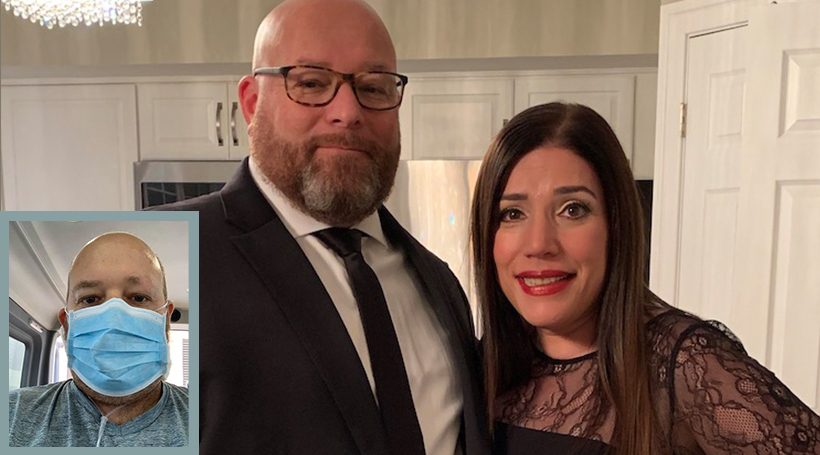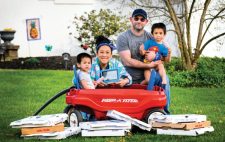When Amy and Brett Breslow arrived at Cooper’s ER in mid-March, South Jersey was just coming to grips with the Coronavirus. Brett had been experiencing mild symptoms that had recently worsened, but the couple expected he would receive some treatment and then return home after a few hours. Funny how things can change in an instant.
“Based on everything we knew at the time, the odds of him contracting the disease and having it become serious were really low,” says Amy. “Older people and those with pre-existing conditions were considered at risk for severe symptoms.”

Brett was taken off a ventilator on April 9.
At the time, South Jersey was operating on a pre-pandemic mindset. Restaurants and shops were still open. Few people, if any, were wearing masks in public. And although the Cherry Hill family suspected COVID-19, they didn’t consider – not for a moment – that the 50-year-old father of 2 was in mortal danger.
Even now, it still seems unreal to Amy that Brett, a Navy veteran and little-league football coach, would become one of the first people treated at Cooper for COVID-19, or that – within hours of being admitted – he would be clinging to life. But Amy was about to begin operating on auto-pilot, as Brett was unconscious and attached to a ventilator to breathe.
“I was watching TV the day Governor Cuomo said that 80 percent of people on ventilators never get off of them,” she says. “It’s astonishing to me and incredible that my husband survived.”
From the start, everything about Brett’s case seemed improbable. No one can pinpoint exactly when and how he contracted the disease, or why no one else in the family tested positive. Back when people were still doing normal things, and not from a social distance, Brett was too.
He could have gotten ill from visiting a friend whose elderly father later tested positive for COVID-19 or during a family excursion to Manhattan. And only a few days earlier, Brett had been exposed to dozens of people while ushering for a performance of Cherry Hill East’s “Legally Blonde.” They also can’t rule out stops in supermarkets, gas stations and other stores before he started feeling like he was coming down with something.
But within days of those initial symptoms appearing, Brett started to feel better. And even when his symptoms returned and the couple took the trip to Cooper’s ER, Brett was able to walk on his own into Cooper. Because of the lockdown, Amy had to watch from the ER window as Brett checked in and was taken by wheelchair beyond her view. But still, she wasn’t all that worried.
“I texted him from the car to let him know I was still waiting for him,” she recalls. “He texted that they took him back, that I should go home and he loved me.”
When Brett stopped responding to her texts, Amy did go home. Hours later, she learned her husband was in respiratory failure. He had been intubated and was on a ventilator. It would be 19 days before Amy would talk to Brett again.
“The doctor basically told me that if he had gone to bed Friday night at home, I would probably have found him dead in the morning,” she says.
Besides attacking his lungs, Coronavirus damaged Brett’s kidneys, requiring him to go on dialysis. He was heavily sedated on morphine while his doctors, consulting with medical experts worldwide, tried various treatments that have helped patients in similar dire straits rebound.
When they learned Brett was eligible for plasma therapy, an experimental treatment, Amy became the face of a public campaign to seek out donors. Behind the scenes, she and family members worked with lawmakers to make it easier for such donations to happen quickly enough to save lives. She also gave emotional appeals to CNN’s Anderson Cooper, The Dr. Oz Show and other media outlets to get blood plasma treatments to Brett and other critically ill patients.
In the end, he didn’t need the plasma. On April 9, he was taken off the ventilator, awakened and breathing again on his own. His family gathered around their iPad at home to watch. Although a bit groggy, Brett could clearly recognize his wife, children and other family members.
“The first thing he asked me was what happened,” she says. “He had no idea that the country went into lockdown after he went into the ER. It was shocking to him.”
Brett is currently at Magee Rehabilitation Hospital in Philadelphia making progress, although the long-term effects of the disease are still unknown. Amy and their kids were able to see Brett for a few minutes – to hug him and say “I love you” – in Magee’s parking garage before he checked in to the rehab center.
Amy created a fundraising project with The Cooper Foundation to buy iPads for ICU rooms, so patients can FaceTime with their families. She also continues to advocate for COVID-19 treatments, sharing information to those still battling the virus.
“Hopefully with the more we learn and share, more people are going to survive. It’s disheartening to only read about all the loss.” Most important, she says, “Don’t think you’re immune to it. You could be 30 years old or 50, completely healthy and this virus could take you down.”
Watch out video interview with Amy Breslow here.














